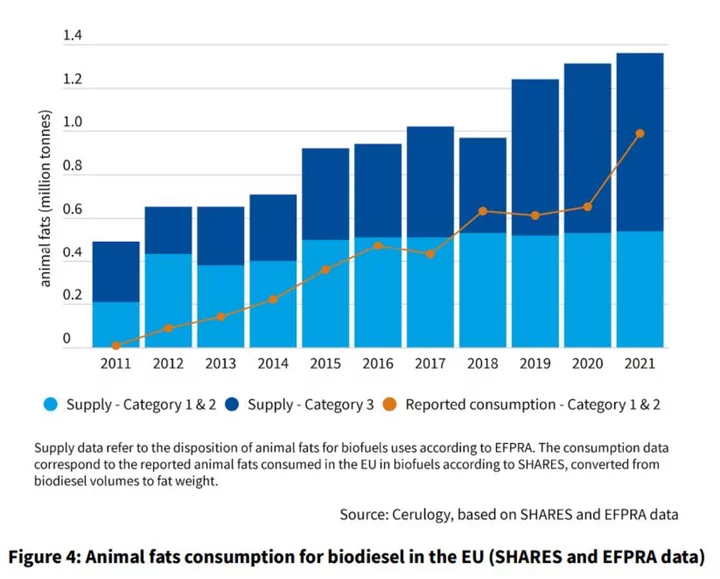Europe’s airlines are quickly tying up the supply of available animal fats to produce biofuels, creating unintended ecological knock-on hazards that include a surge in palm-oil production, according to a new report.
A flight from Paris to New York powered solely by waste biofuels such as animal fats requires some 8,800 dead pigs, according to sustainable transportation advocacy group Transport & Environment, which commissioned the research.
The study, carried out by consulting firm Cerulogy, found that European Union subsidies meant to encourage the use of rendered fats for road and air travel have doubled demand for animal-fat biodiesel over a decade.
With supplies limited, that’s driven up prices for other users of rendered fats in areas such as soap, cosmetics and pet-food manufacturing. Palm oil is the most likely alternative — creating a new environmental fallout because the vast plantations have led to deforestation in countries like Indonesia.
“For years we’ve been burning animal fats in cars without drivers knowing,” said Barbara Smailagic, biofuels specialist at T&E, in an emailed statement. “Now they will be fueling your next flight. But that can’t be sustained without depriving other sectors.”
The research highlights the difficulty of cleaning up an aviation industry whose share of CO2 emissions, now between 2-3% globally, is on track to rise in coming decades. EU policymakers have sought to encourage the partial use of waste fats in jet-fuel production because blending it in with fossil fuel is one of the few ways to cut the industry’s greenhouse gas generation in the shorter term.
Airlines including Ryanair Holdings Plc and Wizz Air Holdings Plc have reached supply contracts with providers such as Neste Oyj, which produces so-called sustainable aviation fuel from renewable waste and raw materials like used cooking oil and animal fats.
The Cerulogy study also found signs that the highest-quality animal fats, which are typically used in pet food, animal feed and cosmetics, are increasingly finding their way into fuel stocks as well.
These fats have historically been more expensive than the lower-quality animal byproducts used in biofuels. But EU subsidies applied to the cheaper ingredients have changed the calculation, creating a financial incentive to mislabel the higher-quality fats, according to T&E.

